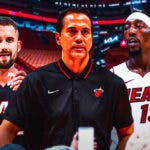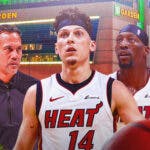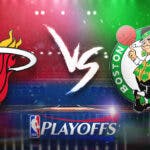The Miami Heat has been a prime free-agent destination throughout the years. The allure of South Beach is quite hard to resist, while the franchise’s winning culture also plays a big part.
The biggest Heat news came in the summer of 2010 when Pat Riley managed to land megastars LeBron James and Chris Bosh to team up with their established superstar Dwyane Wade. This resulted in two NBA titles and four finals trips.
This season, they managed to acquire two-way star Jimmy Butler via a sign-and-trade deal with the Philadelphia 76ers.
As great as their hits have been when it comes to free agency, Miami also had several misses over the years. Here are five of the worst Heat free-agent signings in history.
5. Michael Beasley
Michael Beasley was already considered as the Heat’s biggest draft bust in franchise history when they selected him 2nd overall in 2008. They let him go after two lackluster seasons but interestingly gave him two more chances to redeem himself.
The Heat welcomed the troubled forward back in 2013 to shore up their bench. Despite inconsistency issues that plagued him throughout his career, the lefty-forward churned out 7.9 points on limited minutes.
They gave him another shot in 2015, signing the former lottery pick to a 10-day contract which ultimately became a guaranteed one-year deal. Not much was expected from the Kansas State alum from this point, but he still failed to live up to his once high ceiling.
4. Erick Dampier
Erik Dampier was the Dallas Mavericks’ starting center when the Heat took them on in the 2006 NBA Finals. He was by no means a star, but he did a good job fulfilling his role as a rebounder and rim protector.
He had been on Miami’s radar since then and they managed to sign the 6-foot-11 center in 2010 to a one-year, $1.4 million veteran minimum deal. Miami even parted ways with Jerry Stackhouse just to make room for Dampier.
The Heat was hoping he could replace Udonis Haslem’s production after the latter went down to an injury.
What they got was an injury-prone center who was way past his prime. He played 51 games for the Heat (22 starts) and averaged measly numbers of 2.5 points and 3.5 rebounds in 16 minutes per game.
3. Rafer Alston
Rafer Alston had a short but rather productive stint with the Heat in the 2003-04 season. He left quite an impression with the Heat brass that they decided to bring him back in 2010 after clearing waivers.
Miami gave “Skip 2 My Lou” all the room to operate and even started him at point over Carlos Arroyo and Mario Chalmers. However, Alston did not produce the same production this time around, shooting a dismal 36 percent from the field.
His attitude off the floor was worse, missing one practice and a game with no valid explanation. After failing to communicate with the team, the Heat suspended him for the rest of the season.
2. Mike Bibby
Shortly after rolling the dice on Dampier, the Heat took on another player who was approaching the tail-end of his career in Mike Bibby. Miami was not expecting the same production he had with Sacramento from Bibby, but they were hoping his veteran experience would be of use to their new-formed Big 3.
Bibby forfeited the $6.2 million he was owed by the Washington Wizards and landed with the Heat right before the postseason in 2011. The 6-foot-2 scorer proved he was still a knockdown shooter, tallying 7.3 points, 2.2 rebounds, and 2.5 assists in 22 appearances.
That shooting touch was nowhere to be found in the Finals, as the Heat succumbed to the Mavericks in six games. The Heat opted not to re-sign Bibby the following year and went with the young pair of Mario Chalmers and Norris Cole at the point.
1. Brian Grant
To be fair, Brian Grant was as serviceable as they come throughout his four-year stay in South Beach from 2000-04. The 6-foot-9 slotman enjoyed doing the dirty work, rarely missed games, and played his heart out each time he was on the floor.
However, what made this move questionable was the amount of money Riley had to shell out to avail of his services. The Heat gave him a 7-year, $86 million contract which was superstar money at the time.
Grant was a sixth man at best for his former team Portland Trail Blazers, but Miami deemed his playoff experience quite valuable and opted to overpay him.
His best statistical year came in 2000, notching 15.2 points and 8.8 rebounds in a starting role. He moved back to a reserve role once Alonzo Mourning returned and the Heat acquired more talent in the coming years. His huge contract was invaluable in Miami’s trade for Shaquille O’Neal in 2004.




